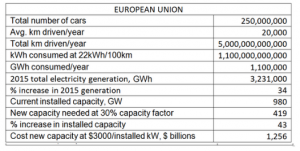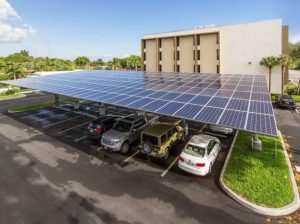In last week’s post, I discussed the increasing momentum behind electric vehicles and the idea that they may begin to displace vehicles driven by internal combustion engines quicker than most people think. In my view, if that were to happen, there are five implications which will have a profound effect on the world.
 The first has to do with the need to produce more electricity to power these cars or change in a fundamental way the way the electricity grid is operating . In a post on Energy Matters, a blog, Rodger Andrews, calculates that most countries will need to increase energy production by about 30% if all of the vehicles were to become electric. I have copied his numbers for the EU here and what is critical about this type of analysis is the assumptions made such as how many kilometers or miles the cars will drive every year and what their efficiency will be.
The first has to do with the need to produce more electricity to power these cars or change in a fundamental way the way the electricity grid is operating . In a post on Energy Matters, a blog, Rodger Andrews, calculates that most countries will need to increase energy production by about 30% if all of the vehicles were to become electric. I have copied his numbers for the EU here and what is critical about this type of analysis is the assumptions made such as how many kilometers or miles the cars will drive every year and what their efficiency will be.
A different issue is how and when this electricity is made and if we can use the electric vehicles, and their batteries to change the entire system. This technology is normally called vehicle to grid (V2G) and has the potential to balance energy demand around the world such that little to no increased generation capacity would be needed, only a smarter grid! The basic idea is that the entire fleet of electric cars would be charged at night, while most people are sleeping and electricity demand is low, and then would be able to offer excess power back to the grid at peak times if needed.
The second implication has to do with the impact on air quality that such a switch would have on the air quality and infrastructure of our cities and towns.Increasingly humanity is living in cities and many of these are tremendously polluted. Outdoor air pollution causes health issues especially in the developing world and electric cars can improve the situation either by generating electricity with cleaner and even renewable technologies, locating power plants outside of urban areas or both thus making a signiifcant improvement. Such a futre will, of course, require extensive charging networks and it is likely that parking garages will be converted into energy storage and charging centers.
 The third implication is that the same smart grid needed for electric vehicles will finally open the door to a broader evolution of the electricity grid towards an extremely decentralized model. This in turn will accelerate the introduction of renewable energy, small scale nuclear power, increased energy conversation and further decrease the demand for fossil fuels. On the one hand such an evolution may finally begin to slow the build up of carbon dioxide in the atmosphere and on the other might drive oil prices down for the long term. The implications of very low prices for oil and even gas will have serious geo-political consequences over the long term especially for the Middle East and specific countries such as Russia, Venezuela, and Mexico.
The third implication is that the same smart grid needed for electric vehicles will finally open the door to a broader evolution of the electricity grid towards an extremely decentralized model. This in turn will accelerate the introduction of renewable energy, small scale nuclear power, increased energy conversation and further decrease the demand for fossil fuels. On the one hand such an evolution may finally begin to slow the build up of carbon dioxide in the atmosphere and on the other might drive oil prices down for the long term. The implications of very low prices for oil and even gas will have serious geo-political consequences over the long term especially for the Middle East and specific countries such as Russia, Venezuela, and Mexico.
The fourth implication may be to accelerate the trend toward shared and autonomous vehicles due to some of the design advantages that electric vehicles have as discussed last week and also the entry of new players in the automotive business.
The final implication which I think we need to pay close attention to is the role of Chinese companies in this evolution as about half of the electric cars sold last year were in China. If Chinese industry can get ahead of the West in electric vehicles and the transition does accelerate, then it may become too late for Western companies to catch up. The evolution of this last implication will depend on the success that firms like Tesla, Volkswagen, Nissan, and Toyota have with their own plans for electric and sustainable mobility.
There are, of course, risks and concerns associated with the transformation but these will be addressed in a third post in this series.



we need implications of electric future asap, to save our world